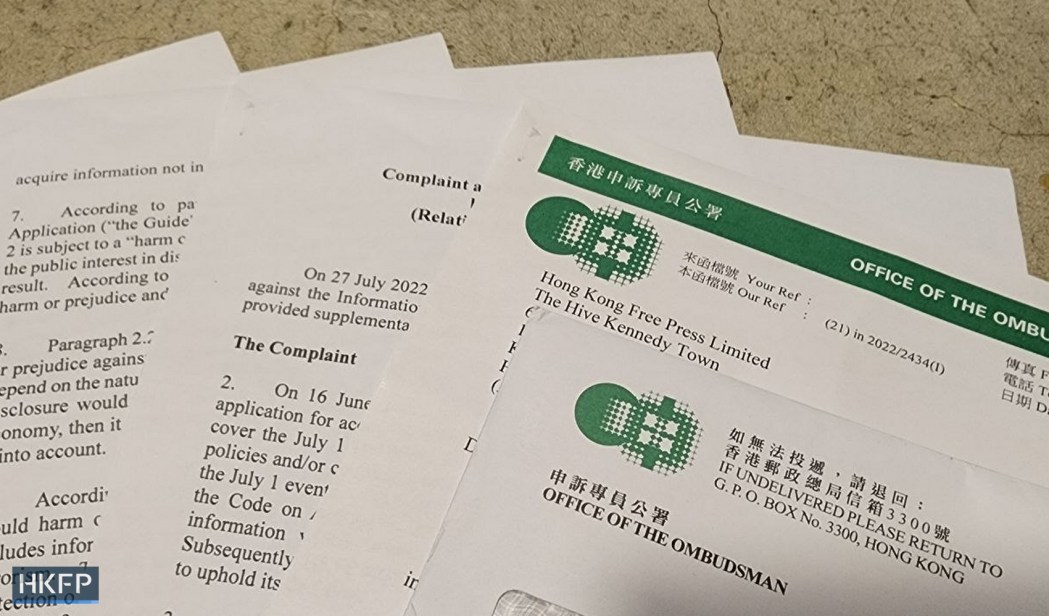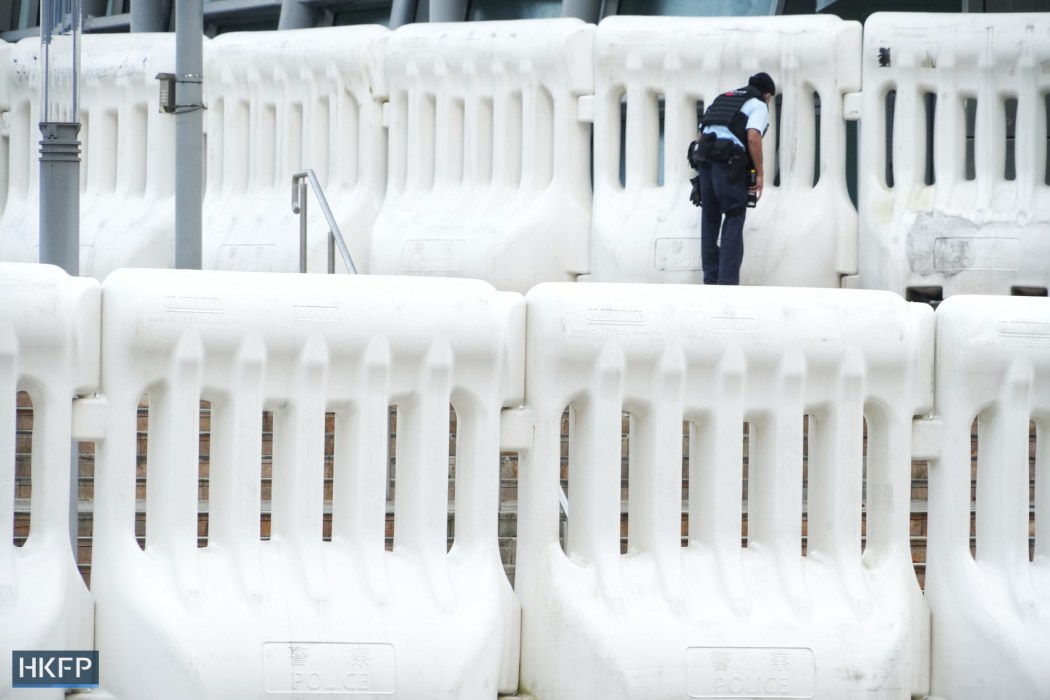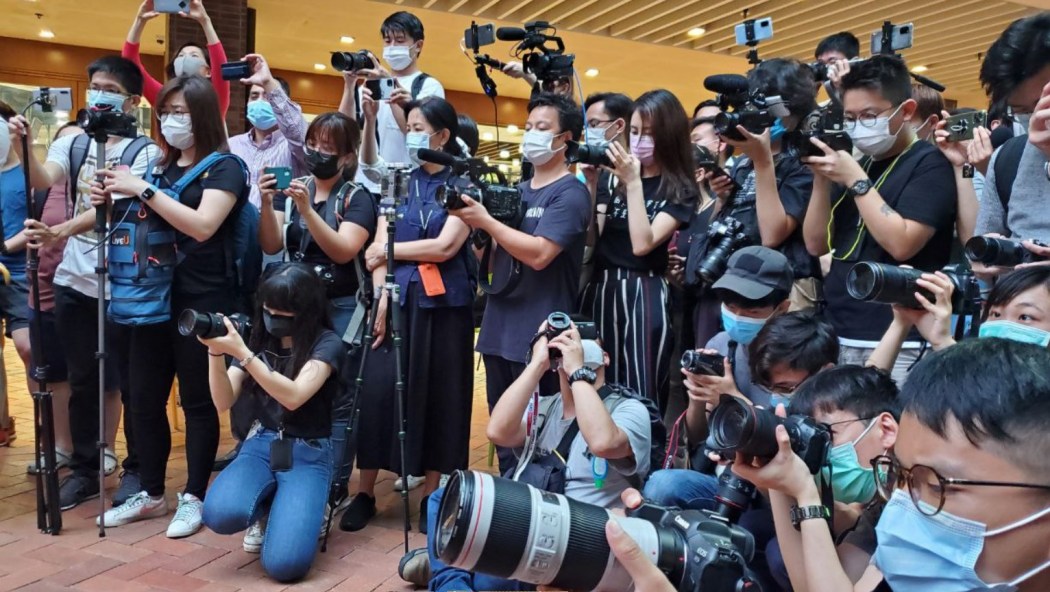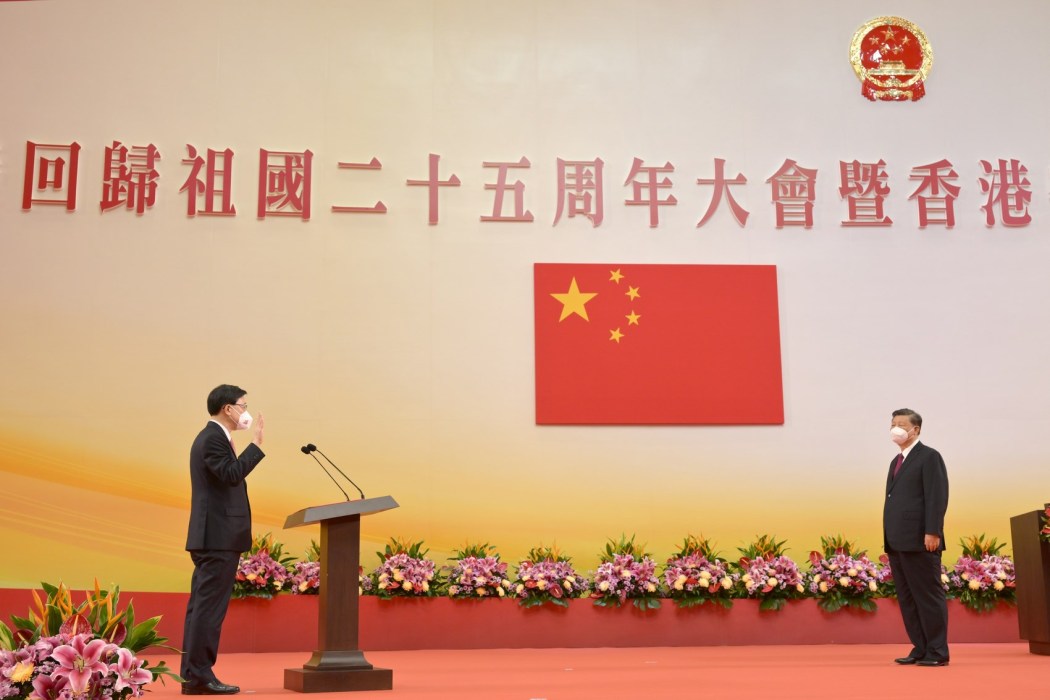The government watchdog has rejected a complaint filed by Hong Kong Free Press (HKFP) related to the authorities’ refusal to disclose its media invite list for Chief Executive John Lee’s inauguration last July 1. The Ombudsman agreed with official assertions that such a revelation would aid “terrorists,” but found “inadequacies” in the government’s handling of HKFP’s complaint, urging more staff training.

Only selected outlets – all of which appear on a publicly-accessible list of media organisations already registered with the government – were privately invited by the Information Services Department (ISD) to the Handover anniversary event, which was attended by China’s Xi Jinping.
Japan’s Nikkei, Asahi Shimbun, and Kyodo News, Taiwan’s CTV, Getty Images in the US, Europe’s EPA as well as Hong Kong’s InMedia, PSHK, TMHK and HKFP were among the government-registered media outlets not invited. Meanwhile, Ming Pao, HK01, Bloomberg, Reuters, the South China Morning Post, Now News and Agence France-Presse had individual journalist applications refused.
Explainer: The decline of Hong Kong’s press freedom under the national security law
The Ombudsman ruled that the full, publicly-accessible list of government-registered outlets posed little threat in itself. However, the watchdog said potential risk stemmed from the fact that reporters from outlets invited to cover July 1 celebrations had been subject to security screening: “A comparison between the media invitation list and the eventual turnout of reporters at the event venues may assist terrorists to infer how the security clearance mechanism was operated and [how to] possibly evade such mechanism[s] in the future,” the watchdog upheld.

The Code on Access to Information stipulates that requests may be declined if disclosure “would harm or prejudice Hong Kong’s security,” and the public interest must be weighed against the potential for “actual harm,” the watchdog said. It added that the ISD said Covid-19 regulations were a factor in the media restrictions, and a “high-quality live feed” was provided to all media outlets.
“ISD agreed that disclosure of the requested information after the relevant events may carry some public interest,” the watchdog said, but “the harm which might arise from the disclosure would be extremely serious.” The Ombudsman said the government’s explanation was “not unreasonable.”
No guidelines, policies, communications
HKFP also requested the government disclose its guidelines, policies and communications related to how outlets were chosen to cover the Handover events.

Last June, hand-picked media outlets were initially told they could send only 10 staff to the Handover events, whilst broadcasters could send 20. But, citing pandemic concerns, each outlet was later only able to send one journalist, and each would have to enter a “closed-loop” system involving daily tests and a night at a hotel. There were no such restrictions on the press when the small-circle election was held at the same venue two months earlier.
The ISD told the Ombudsman that it did not have any guidelines, policies or communications related to selecting media outlets, which the watchdog found to be a reasonable explanation. However, it ruled that the ISD should have stated this more clearly in its response to HKFP, as it urged more staff training.
Timeline of HKFP’s complaint – click to view.
June 16, 2022: HKFP complains to the Chief Executive’s Office, Lee’s office, and submits an Access to Information Request to the ISD arm requesting a full list of media organisations invited to cover the Handover anniversary events. Under the code, HKFP also requested details of internal guidelines and communications related to how outlets are chosen.
July 7, 2022: The ISD rejects HKFP’s request citing security reasons. HKFP appeals the decision.
July 26, 2022: The ISD rejects HKFP’s appeal.
July 27, 2022: HKFP complains to the government watchdog, the Ombudsman.
August 3, 2022: The Ombudsman launches an investigation.
January 13, 2023: The Ombudsman completes its probe and finds HKFP’s complaint to be unsubstantiated. However, it finds inadequacies in the government’s conduct.
“We urge ISD to learn from this case and seek to improve its future handling of information requests under the code… We recommend that ISD provide its officers with more training on the Code so that the latter could better address information requests when the Department does not possess the requested information.”
When HKFP asked the ISD if more training would be provided, a spokesperson said: “Training on access to information is already in place and we will ensure colleagues handling information requests will act in accordance with the Code on Access to Information.”
Press freedom ‘unlimited’
At the time, the Hong Kong Journalists Association criticised the July 1 media restrictions: “”[C]iting a vague reason for rejection seriously undermines press freedom in Hong Kong. The HKJA urges the authorities to make remedial arrangements and protect the right to report.”
Last April, Lee said that press freedom was in “the pocket” of Hongkongers. Two months later, he said: “As long as they do not violate the law, freedom of the press is unlimited.”
Last week, Lee said that the city still needed to root out “fake journalists” and “fake news,” without giving examples.

Hong Kong has plummeted down the Reporters Without Borders international press freedom ranking, diving 68 places to 148th last year, sandwiched between the Philippines and Turkey. The NGO cited journalist arrests, newsroom raids and the closure of multiple media outlets.
Support HKFP | Policies & Ethics | Error/typo? | Contact Us | Newsletter | Transparency & Annual Report | Apps
Help safeguard press freedom & keep HKFP free for all readers by supporting our team























